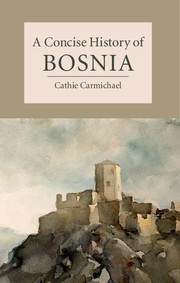Book contents
- Frontmatter
- Contents
- List of figures
- List of maps
- Acknowledgements
- Preface
- Chronology of events in Bosnian history
- 1 Introduction
- 2 Bosnia, Hercegovina and the Ottoman Empire (1463–1912)
- 3 Rebellion, war and the Habsburgs (1875–1918)
- 4 Royalist Yugoslavia, the Independent State of Croatia and the Second World War (1918–1945)
- 5 Bosnia and the Communist experiment
- 6 Bosnian independence, war and genocide
- 7 Conclusion: ‘unmixing’ Bosnia and Hercegovina
- Bibliography
- Index
3 - Rebellion, war and the Habsburgs (1875–1918)
Published online by Cambridge University Press: 05 July 2015
- Frontmatter
- Contents
- List of figures
- List of maps
- Acknowledgements
- Preface
- Chronology of events in Bosnian history
- 1 Introduction
- 2 Bosnia, Hercegovina and the Ottoman Empire (1463–1912)
- 3 Rebellion, war and the Habsburgs (1875–1918)
- 4 Royalist Yugoslavia, the Independent State of Croatia and the Second World War (1918–1945)
- 5 Bosnia and the Communist experiment
- 6 Bosnian independence, war and genocide
- 7 Conclusion: ‘unmixing’ Bosnia and Hercegovina
- Bibliography
- Index
Summary
HABSBURG RULE
In the nineteenth century, as Ottoman imperial power collapsed in the Balkans, national groups and states vied to replace its domination. The Bosnian lands were caught in a greater regional struggle for power that involved the British Empire, Imperial Russia and the Central European powers, as well as all the Balkan states. This struggle became known as the Eastern Question and preoccupied the European diplomatic communities until the establishment of the modern Balkan states from 1912 to 1918 and Turkey in 1923. Horror at atrocities committed during the long break of Turkey-in-Europe often dominated news coverage. In 1875, the Ottomans began to lose control after a rebellion in Hercegovina, which was linked to the spread of nationalist aspirations in neighbouring Montenegro and Serbia. The small village of Nevesinje lit the spark that spread across the region. After a bad harvest, the villagers were unable to pay their tithes. In order to avoid Ottoman retribution, they fled to Montenegro. The remaining rayah, too old to flee, were slaughtered in their homes by Muslims. In revenge, the inhabitants of Nevesinje committed atrocities against Muslims once they had returned and forced many of their neighbours to join the rebellion. Rebel Bosnians were killed after attempting to overthrow the Ottomans, but soon began to turn the tide against the authorities as Catholics from Hercegovina also joined the uprising. A vivid account of the events was set down by the archaeologist Arthur J. Evans who sent his reports to the Manchester Guardian and later wrote his experiences up in a book. He was sympathetic to the rebels who he saw as oppressed by centuries of Ottoman rule. Nevertheless, Evans also recorded crimes committed by them and the use of coercion: ‘If a village refused to throw in its lot with the rebels, they first burnt one house or one maize-plot, and then another, till the unhappy villagers, forced to choose between ruin and rebellion, consented to join their ranks.
- Type
- Chapter
- Information
- A Concise History of Bosnia , pp. 38 - 59Publisher: Cambridge University PressPrint publication year: 2015



